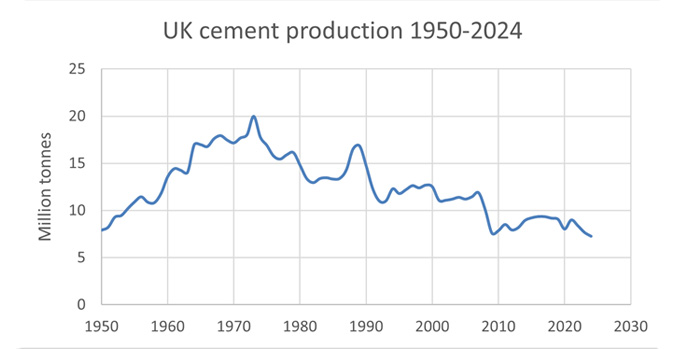UK cement production has hit its lowest level in 75 years, thanks to rising energy, regulatory and labour costs, according to recent data from the Mineral Products Association (MPA).
In 2024, the UK made 7.3 million tonnes of cement, which is nearly half of the 15 million tonnes it produced in 1990.
The MPA also said that the amount of cement being imported to the UK has ‘nearly tripled’ over the past 20 years, from 12% of all sales in 2008 to 32% in 2024.
Increased importation means that the UK construction supply chains are left exposed to the risks of ‘volatile international markets’ as well as increased carbon from transportation.
It also means cement production jobs are at risk, according to the MPA, as an increase in importation means there is a risk that domestic jobs could disappear in the future if UK cement production continues to decline.
This ongoing decline in UK cement is due to manufacturers having to face ‘some of the highest industrial electricity prices among developed nations’, the MPA argued. It added that uneven carbon taxation means importers – especially those outside of the EU – don’t pay the same costs for their emissions.
It is hoped that the UK’s Carbon Border Adjustment Mechanism will address this from 2027, but the MPA argued that this needs to be supported with a procurement policy that ‘prioritises domestically produced materials’.
As the main ingredient in the most-used construction material – concrete – cement plays a key role in building foundations and structures.
According to the MPA, as much as 750,000 tonnes of cement could be needed for a project like Sizewell C (a new nuclear power plant currently under construction in Suffolk), with nearly 8,000 tonnes required for a new hospital and between 3 to 5 tonnes needed for the construction of a four-bedroom house.
Dr Diana Casey, executive director for cement and lime at the MPA, said: ‘Cement is an essential industry, but the sector is increasingly under threat. We’re calling on the government to help put domestic production on a level playing field so that it can compete fairly with imports.
‘Cement quite literally underpins the nation’s growth and we can’t deliver new homes, schools, hospitals, transport links or clean energy infrastructure without it. The UK has a choice: to build these vital development projects with UK-made cement, or to build them with imports – sending jobs, investment and economic growth overseas.’






